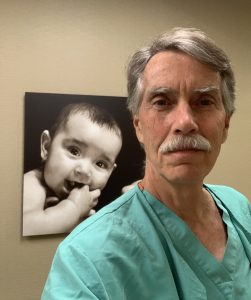Throughout his long medical career in obstetrics and gynecology, Dr. David Schaller has delivered so many babies that he stopped counting at 3,500, and some 2,000 of those infants were delivered in the Yampa Valley.
When Schaller acquired a one-physician ob/gyn practice in Steamboat Springs in the summer of 1993, he soon began delivering around 50% of the babies in the Yampa Valley, he said. Two years later, he was delivering around 90% of the babies in the valley, calling those first two years in private practice and delivering babies at then Routt Memorial Hospital the most challenging of his career.
Those 2,000 local deliveries are the reason his two sons never really enjoyed going grocery shopping with their dad, as the food list was often delayed by parents showing off their growing babies, Schaller said.
Making time to listen to patients and “give people space to open up” has been one of the doctor’s most important medical skills, which often led him to run behind in his daily schedule, he said with a big smile. New moms say the doctor answers questions thoroughly and listens carefully to concerns.
Schaller said he learned that a patient’s initially voiced concern is only the first layer to peel down to the root medical problem. He also never wanted to be the type of doctor who fielded a patient’s questions with his hand already on the doorknob trying to leave the exam room.
“Above all else, he always listens and leans in and puts the patients first,” said Dr. Laura Sehnert, chief medical officer at UCHealth Yampa Valley Medical Center, who has worked with Schaller since 2007. “He has a real passion for women’s health and care for women of all ages. He lived and breathed his role as a caregiver, always available, always willing to help.”

The obstetrician originally was scheduled to retire a year ago, until a colleague at UCHealth Women’s Care Clinic needed to go on maternity leave.
“True to his character, when we needed help, he jumped right back in,” Sehnert said.
Even during critical, high-stakes emergency situations, Schaller found a way to stay calm and compassionate, and take the time to check in with the whole medical team.
“He’s the perfect blend of professionalism with the really personal touch and an excellent communicator,” Sehnert said. “He’s just kind, and his passion is contagious.”
As a younger adult, Schaller worked in respiratory therapy, as a tennis instructor, and a chef in a restaurant where he met his now wife of 39 years, Tibby Speare.
Schaller started his college life moving in a different direction when he earned a bachelor of fine arts degree at the University of Colorado Boulder. He remains a big fan of art, and even creates his own.
His professional goals evolved as he watched his wife’s mother dying in hospice care. He decided he wanted to work in a field with more impact, immediacy and connections with people. He completed medical school at University of Colorado School of Medicine in Aurora, and completed his four-year residency at Saint Joseph Hospital in Denver.
Schaller, who retires in December, said he still sees some of the same local patients he began caring for 30 years ago. At age 68, years after most aging doctors, Schaller stays on the schedule at UCHealth Women’s Care Clinic to take those middle-of-the-night calls for deliveries or emergency room situations.
Asked about the most significant advances in women’s care in the past 30 years, Schaller pointed to 3D ultrasounds that can show a baby’s facial features compared to previous grainy ultrasounds. Ectopic pregnancies where an embryo attaches outside the uterus can now be found quickly on imaging scans, when in the past, women were admitted into the hospital for days for observation.
A hysterectomy that used to keep women in the hospital for a few days can be performed laparoscopically with smaller incisions. Postpartum depression is a recognized and acknowledged disease. Minimally invasive surgeries are more common, and the use of strong pain medicines has decreased.
Schaller said he will miss the day-to-day interactions with patients and families, the challenges of problem-solving complex medical cases, and working with caring and dedicated colleagues.
“I’ll miss the privilege to witness the unbelieve joy, drama, incredible strength, perseverance and pure emotion at deliveries that never, ever became routine,” Schaller said.
The most satisfying part of his work was “when complicated, stressful pregnancies turn out well,” expressing gratitude for being able to serve the community for 30 years.
What he will not miss, he said, are those on-call phone summons in the wee hours of the morning.

